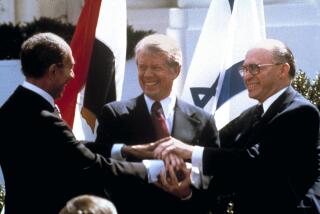Pakistan Eases Kashmir Presence
- Share via
ISLAMABAD, Pakistan — The Pakistani government made a peace overture to its rival India on Wednesday, announcing the withdrawal of some of its troops from the volatile border of Kashmir, the flash point of two wars between the South Asian nuclear powers.
The gesture came in response to India’s offer to extend by a month a cease-fire with Islamic militants waging a bitter insurgency in the Indian-held part of the divided Himalayan territory.
Pakistan urged India to withdraw troops from its side of the Line of Control, the 1973 cease-fire line through Kashmir, which last year was the scene of fierce fighting between India and Islamic militants. Those clashes nearly escalated into another full-fledged war between the two countries.
“The fact is that we have withdrawn troops from the Line of Control and that is a very positive step and we would like to see India now reciprocate,” said Rashid Quereshi, a Pakistani army spokesman.
Concerns about India and Pakistan’s bloody rivalry over Kashmir--which both claim in its entirety--heightened after the two countries tested nuclear weapons in 1998. They have fought two wars over the territory, divided between them after British rule in the subcontinent ended in 1947.
Pakistan has 25,000 to 30,000 troops deployed along the frontier, where they and Indian forces often trade fire. The army did not specify the number of troops that would be withdrawn, but it said the pullback already had begun.
The withdrawal “manifests Pakistan’s earnest and genuine desire to de-escalate the situation in order to facilitate the process of meaningful dialogue on the issue,” the army said in a statement.
The pullout is in addition to a withdrawal of some troops ordered by Pakistan’s military ruler, Gen. Pervez Musharraf, soon after he came to power in an October 1999 coup. “Those soldiers never returned to the Line of Control, and this is more that we are withdrawing,” Quereshi said.
In Washington, President Clinton welcomed the moves by both countries as steps toward reducing tension in the region.
India’s “initiative, along with Pakistan’s announcement today that it will withdraw part of its forces deployed along the Line of Control and its earlier decision to exercise maximum restraint there, raises the hopes of the world community that peace is possible in Kashmir,” Clinton said.
Islamic guerrillas battling Indian forces in the state of Jammu and Kashmir are demanding either independence or unification with Pakistan. India accuses the government in Islamabad of fomenting the insurgency, but Pakistan said it gives only moral and political support to the rebels, many of whom are based on its soil.
India says it is willing to open negotiations with the guerrillas but refuses to include Pakistan in the talks. New Delhi has refused separate negotiations with Pakistan over the broader issues of their rivalry until it halts support for the insurgents.
India called a unilateral cease-fire in Kashmir in early December. Though Islamic rebels rejected a truce, Pakistan responded at the time by calling a halt in hostilities along the Line of Control, and tensions were reduced.
On Wednesday, Indian Prime Minister Atal Behari Vajpayee told Parliament that the cease-fire--due to end Dec. 28--would be extended until at least Jan. 26, India’s Republic Day. He said that, despite some fighting over the past weeks, the cease-fire had been a success.
“A distinctively different and more optimistic mood prevails. The constituency for peace has expanded significantly,” Vajpayee said.
Pro-Kashmiri Islamic groups were skeptical about both India and Pakistan’s moves.
One of the top guerrilla groups, the Pakistani-based Hizbul Moujahedeen, said it was monitoring the Pakistani withdrawal. Other militants dismissed it as a means to bring peace. “Such moves won’t get the desired results. Jihad [holy war] will continue until Kashmir’s liberation,” said Yahya Mujahed, a spokesman for the guerrilla group Lashkar-e-Taiba.
The All Parties Hurriyat Conference, Kashmir’s main separatist alliance, reacted cautiously to the cease-fire extension, saying talks among India, Pakistan and the representatives of the Kashmiri people were essential to resolve the 11-year-old insurgency.
More to Read
Sign up for Essential California
The most important California stories and recommendations in your inbox every morning.
You may occasionally receive promotional content from the Los Angeles Times.













